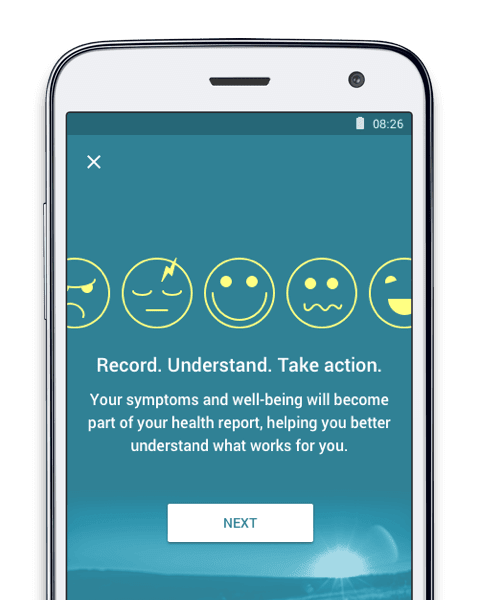Sleep disorders, sexual dysfunction, anxiety, and substance abuse. These are just a handful of the ways psoriasis can affect a person mentally. In this article, we look at how the physical symptoms of psoriasis are linked to the mental, and why addressing one’s well-being is a vital component of any psoriasis treatment plan.
What is Psoriasis?
Most people know psoriasis, quite rightly, as a skin condition. However, it is far more serious than simply a rash. While a great deal is yet to be understood about psoriasis, it is widely believed to be an autoimmune disease, meaning the immune system behaves abnormally and attacks the body.
It is a similar process that causes multiple sclerosis (MS) and rheumatoid arthritis.
In the case of psoriasis, it causes a rapid production of skin cells – too many for the body to shed. These dead skin cells cause the raised, red patches that characterize the most common form of psoriasis: plaque psoriasis.
There are, in fact, several different forms of psoriasis: plaque, guttate, inverse, pustular, and erythrodermic. You can read about their differences in a previous blog post: Psoriasis in All Its Forms: Everything You Need to Know.
The inflammation caused by psoriasis is also believes to increase the risk of complications such as heart disease.
There is also overwhelming evidence that people living with psoriasis are far more likely to develop mental health conditions than the general population.
What is Life Like with Psoriasis?
“I first was diagnosed with psoriasis when I was about 7. I have had psoriasis for over 12 years now and now it is about as bad as it has ever been. I have taken just about every medication known to the world, but they have not helped me in the least bit… Is there no end to psoriasis? Even at this very moment I can barely sit still. It just gets me on edge!!
“The problem is that it will never go away. I need a break.”
Those words are taken from the university journal of Howard Chang, who contributed a guest post to this blog in April.
He has lived with plaque psoriasis since childhood, which at its worst covered 95% of his body.
He was teased by his brother. His parents didn’t understand. He was bullied at school. His self-esteem was in tatters and he isolated himself from the world.
It took him decades to find the right treatment that allowed him to move forward with his life.
John Redfern, who also shared his story with us, was a rising star in the world of Gaelic football (one of the national sports of Ireland, if you aren’t familiar with it).
“I was so embarrassed I refused to shower after games because of psoriasis all over my back, torso, arms, legs, etc. I always looked to wear the long sleeve jerseys to cover up psoriasis on my arms.”
He quit at the age of 18.
Like Howard, the mental challenge of dealing with psoriasis has continued well into his adult years.
These are just two examples. 125 million people around the world live with psoriasis – around 3% of the population. While the severity of psoriasis varies significantly, many millions of people will have experienced mental health problems as a result of psoriasis.
Other posts you may be interested in on the MyTherapy blog:
- 3 Innovative Apps Making Life with Psoriasis Easier
- 5 Conditions with Surprising Links to Heart Diseases
The Link Between Chronic Conditions and Mental Health
The connection between chronic illnesses and comorbid mental health conditions is well documented.
Attaching figures to mental health conditions is notoriously difficult. Unfortunately, the stigma surrounding mental health still prevents many people from speaking out about issues.
It is even trickier to identify mental health conditions that are comorbid with chronic diseases. Common symptoms of mental health conditions – such as lack of sleep, appetite, and energy – are also common to many chronic diseases, making it difficult for clinicians to identify a separate mental health condition.
There is also a normal ‘grieving’ period for one to go through having been diagnosed with a chronic illness, and a certain amount of distress is to be expected. Again, identifying the point it becomes a mental health condition is difficult.
The Canadian Mental Health Institution estimates that “people living with chronic physical health conditions experience depression and anxiety at twice the rate of the general population.”
Last year, the University of Waterloo estimated that people between the ages of 15 and 30 living with a chronic illness are three times more likely to attempt suicide.
Psoriasis and Mental Health
The latter figure is particularly relevant to those living with psoriasis, as it is often diagnosed at a young age.
An app called PsoHappy was released in 2016, with which those living with psoriasis can complete short surveys about their happiness.
Its latest report, which is based on responses from over 120,000 people, found that people living with psoriasis subjectively rated their happiness as being 30% lower than the general population.
It also revealed that loneliness is more prevalent in those living with psoriasis, while 48% feel their healthcare professionals do not fully understand the impact of psoriasis on their mental well-being. The other 52%, tellingly, reported a significantly better happiness level.
A Portuguese study published last year highlighted sleep disorders, sexual dysfunction, personality disorders, anxiety, adjustment disorders, depression, and substance-related and addictive disorders as being prevalent in people living with psoriasis.
Another estimated that 84% of those living with psoriasis have a psychiatric comorbidity, compared to 32% in those without psoriasis.
All of this supports the anecdotal evidence of Howard and John, plus the dozens of stories shared online by those in similar situations.
What’s more, stress and emotional distress is known to trigger flares in psoriasis. This, in turn, exacerbates the mental health issues, creating a vicious cycle that is difficult to break.
“This means that the psychiatric condition, such as anxiety symptoms or even a specific anxiety disorder, worsens the skin disease. The aesthetic consequences of having psoriasis are worsened as a consequence, worsening the associated anxiety condition.”
– Psoriasis and Associated Psychiatric Disorders
Psoriasis can be the root cause of one’s mental health conditions, or the two can be present independently. Regardless, it seems irrefutable that once a person is living with both, they often become intrinsically linked.
What Can Be Done?
The research and studies performed on the relationship between psoriasis and mental health often conclude by focussing on two key areas.
The first, as touched on above, is one’s relationship with healthcare professionals and the level to which mental well-being is considered.
The second is the public ignorance and insensitivity that fuels the stigma surrounding psoriasis.
Regarding the former, the difficulties in diagnosing mental health issues in a person living with psoriasis are well-documented.
“Despite these difficulties, it is essential to diagnose and treat depression in patients with chronic conditions,” noted a study from 2000. “Even mild depression may reduce a person’s motivation to gain access to medical care and to follow treatment plans.”
In the 18 years since those words were written, discussing mental health has certainly become less stigmatized and more socially acceptable.
However, the aforementioned PsoHappy study suggests there is still a long way to go, and that many people living with psoriasis do not believe their mental well-being is adequately addressed.
That very report acknowledges “the need for putting well-being on the global healthcare agenda.”
Doing so will help break the cycle that forms with psoriasis and mental health conditions, and the subsequent exacerbation of each.
Tackling the Stigma Surrounding Psoriasis
Tackling the social stigma of psoriasis, like that of mental health, is an ongoing mission. The sharing of education and information is key, so questions such as “is it contagious?” and people avoiding physical contact becomes less common. This can help avoid the social isolation those like Howard have experienced.
The social stigma of psoriasis has been directly linked to depressive symptoms.
Similarly, those perceived to be receiving low social support from friends, families, and partners, are more at risk of depressive symptoms.
In fact, the level of stigmatization one perceived and level of social support, were each greater indicators of the risk of depression than the severity of the physical symptoms of psoriasis.
Identifying those who have experienced high levels of stigmatization and low levels of social support is vitally important in the treatment of psoriasis.
And continued efforts to combat the stigma will have tangible benefits for those living with psoriasis.
Of course, this issue of psoriasis and mental well-being is far more complex than can be expressed in this humble blog post. However, it is one that cannot be ignored.
The effects of psoriasis are both physical and mental, both of which must be addressed for truly adequate treatment to be achieved.
Take a look at some of the other posts on the MyTherapy blog:



